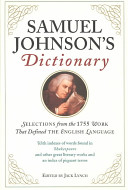
Samuel Johnson's Dictionary
By - Johnson, Samuel
Floor
-
Ground Floor
Published
-
Walker & Co., New York, 2003
ISBN 10 - 0802714218
ISBN 13 - 9780802714213
Book Status
-
1 Qnty Available with us.
Subject
-
English language
Shelf No
-
1
common.call_no
-
423 JOH REF
common.physical_description
-
vii, 646 pages : illustrations ; 24 cm
Notes
-
includes bibligraphies and index.